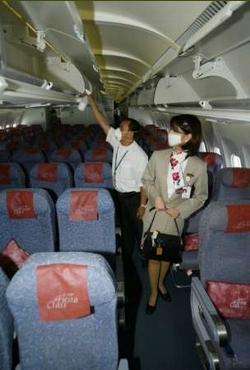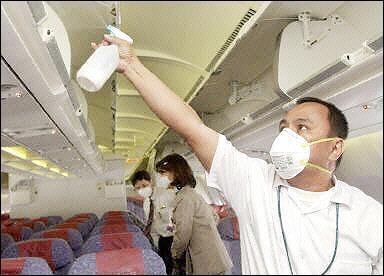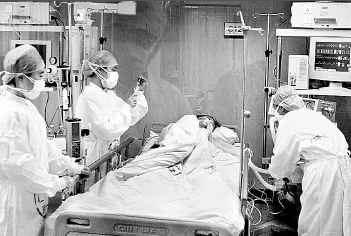How Real Is The New Threat?
 It's a feeling like we had in the days after the
September 11th terror attacks. Every time you got on a commercial
flight, you wondered about the people around you. Could they be
terrorists?
It's a feeling like we had in the days after the
September 11th terror attacks. Every time you got on a commercial
flight, you wondered about the people around you. Could they be
terrorists?
Now, even though the threat of airborne terrorism is still very
real and very much on the minds of government and airline
leaders... the latest cause for fear in the cabin is SARS: Severe
Acute Respiratory Syndrome.
Quarantining Planes
In the 19 months since the terror attacks on the US, commercial
flights have been delayed, intercepted, searched and searched
again.
In the past three months since SARS began to spread from East
Asia, commercial flights have been delayed, quarantined, cleaned
and cleaned again. All the while, passengers are staying away in
droves.
Earlier this month, an American Airlines flight 128 from Tokyo
to Santa Clara (CA), the cabin crew noticed five passengers who
seemed to have SARS-like symptoms. The plane landed, but the
passengers weren't allowed to disembark. They were quarantined. The
five passengers suspected of having SARS were carried away by
ambulance to waiting hospitals. Eventually, all passengers were
released and the five turned out to be SARS-free. But on April 4,
President Bush signed into law a rare executive order making it
legal for public safety officials to quarantine American citizens -
against their will, if necessary.
Down And Out... Again
 Together with the war on terror and the war on
Iraq, the SARS epidemic has only served to increase the public's
fear of flying. But how real is the threat?
Together with the war on terror and the war on
Iraq, the SARS epidemic has only served to increase the public's
fear of flying. But how real is the threat?
Actually, there is cause for concern, say health officials. SARS
can be spread by close physical contact. But the good news is that
airline filtration systems make the air much cleaner than before.
As a result, passengers are less likely to catch a virus like SARS.
Few SARS cases, if any, have been reported as a direct result of
contamination on a commercial flight.
“We do several things to minimize disease spread on our
airplanes,” says Dave Space, a research scientist for cabin
air quality at the Boeing Company, in an interview with MSNBC.com.
“First, we design air flow patterns that minimize flow
between the fore and aft parts of the plane.”
But the HEPA filtration system only works when the cabin is
pressurized. Sitting on the tarmac, the vents are shut off. Therein
could lie the real danger.
AAPA Takes Steps To Disinfect Planes - And Air Travel's
Image
Hardest hit among the world's air carriers are those in Asia.
The Association of Asia Pacific Airlines (AAPA) says its 17 members
are taking the following precautions against SARS:
- Close cooperation with government health agencies.
- Establishment of quarantine zones in airport terminals.
- Screening passengers for SARS before they board a flight. In
Hong Kong... health officials now take the temperatures of all
outbound passengers, hoping to prevent the spread of the deadly
disease. Those suspected of being infected are denied
boarding.
- Keeping an eye on passengers during all flights. Flight crews
are being told what symptoms to look for in SARS suspects. If they
spot the symptoms, the entire aircraft could be quarantined.
- More stringent cleaning of airline cabins between flights.
- Dissemination of SARS information to passengers and crew.
- Providing masks on certain routes for both passengers and crew.
On some routes, cabin crew members wear plastic gloves when serving
meals and drinks.
The Worst Toll Is On Airlines
 But AAPA Director General Richard Stirland says
some countries are taking "arbitrary measures" to prevent the
spread of SARS and are inadvertently hurting the airline industry
in the process. For instance, he says, some countries have banned
inbound flights from those nations hardest-hit by SARS. Government
warnings about SARS and air travel have forced AAPA carriers to cut
more than 650 flights a week this month alone. Now, Stirland says,
it's time for those governments and companies invested in
commercial air travel to share the financial burden of preventing
SARS from spreading.
But AAPA Director General Richard Stirland says
some countries are taking "arbitrary measures" to prevent the
spread of SARS and are inadvertently hurting the airline industry
in the process. For instance, he says, some countries have banned
inbound flights from those nations hardest-hit by SARS. Government
warnings about SARS and air travel have forced AAPA carriers to cut
more than 650 flights a week this month alone. Now, Stirland says,
it's time for those governments and companies invested in
commercial air travel to share the financial burden of preventing
SARS from spreading.
 "While the malaise is very focused on certain
countries and cities and the airlines operating from and to those
destinations are suffering disproportionately, even airlines based
thousand of miles away have been hit hard," said Stirland
(right).
"While the malaise is very focused on certain
countries and cities and the airlines operating from and to those
destinations are suffering disproportionately, even airlines based
thousand of miles away have been hit hard," said Stirland
(right).
"Besides reducing frequencies and cutting costs within their
control, airlines are looking at other ways in which their exposure
to the financial consequences of SARS can be reduced," Stirland
said in a statement issued in Kuala Lumpur, Malaysia. "Airport and
air traffic management services could and must reduce their
charges, rents and other burdens imposed on the airlines regardless
of the fluctuations of the market and in addition governments
should look again at state provision of war risk insurance and at
security charges for both passengers and cargo being paid out of
general taxation, rather than by impositions on the airlines as
this is particularly urgent in view of the fact that US carriers
are already receiving government assistance in the areas of
insurance and security costs. Similarly, other suppliers should be
willing to take a realistic look at prices and payment terms in the
light of the catastrophic situation; this includes everyone from
the aircraft manufacturers to the fuel companies to the ramp
handling agencies."

So, How Serious Is The Risk Of Catching SARS Inflight?
Actually, quite small, say health officials - especially if the
plane involved doesn't travel to Asia. Dr. Mark Rosen, chief of
pulminary and critical care at New York's Beth Israel Hospital,
tells MSNBC.com, “If the travel is in the United States,
South America or Europe, I wouldn’t lose any sleep worrying
about SARS. Of course you don’t know for sure, but life is
full of uncertainty. If you want a guarantee of being safe, stay
home and close the door.”
 ANN's Daily Aero-Linx (04.15.24)
ANN's Daily Aero-Linx (04.15.24) Classic Aero-TV: 'No Other Options' -- The Israeli Air Force's Danny Shapira
Classic Aero-TV: 'No Other Options' -- The Israeli Air Force's Danny Shapira Aero-News: Quote of the Day (04.15.24)
Aero-News: Quote of the Day (04.15.24) Airborne 04.16.24: RV Update, Affordable Flying Expo, Diamond Lil
Airborne 04.16.24: RV Update, Affordable Flying Expo, Diamond Lil ANN's Daily Aero-Term (04.16.24): Chart Supplement US
ANN's Daily Aero-Term (04.16.24): Chart Supplement US








